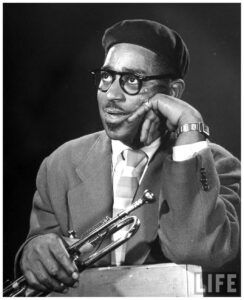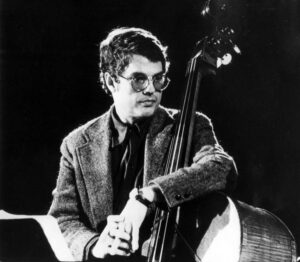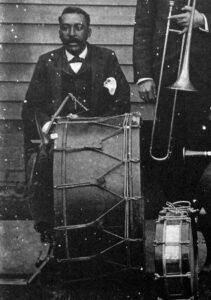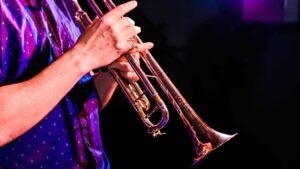With 2021 fast approaching and auditions for next year coming to a close in January, we decided to reach out to you and see what questions you had for our faculty before the new year of learning commences!
Here’s what some of our leading educators had to say in response to your questions:
What makes jazz an important form of music to learn?
Andrew Shaw (Head Bass Educator): For the aspiring musician, learning jazz provides a complete package. Jazz music in all its forms requires of musicians the ability to understand and manipulate melody, harmony, rhythm and time. It also demands technical control of one’s instrument. Therefore, it provides the complete skill set, which can be applied to any other genre of music.
One of the most important things about any kind of music is the groove. Jazz swings. If you can swing, you can make anything groove.
Being largely improvised music, jazz musicians are required to compose in the moment, making decisions about the pace and direction of a melody in real time, where composers would be able to ponder decisions for minutes, hours or days. So, if you can improvise a melody, you can also write one and create original music.
Dave Sanders (Head Drum Educator): Jazz is an important form of music to learn for any aspiring drummer. The drum kit itself evolved by the way of jazz. From the simplest of setups (bass drum and snare drum) to multi-tom kits, it has all evolved hand in hand with this music we call jazz. In fact, even the double-kick drum kit was invented by a jazz drummer… Louie Bellson! Check this out:
Learning to play jazz will not only expand your co-ordination on the drum set, but it will also teach you about song form and composition. All of this is important for the drummer.
Joshua Hatcher (Head Saxophone & Woodwind Educator): Jazz is an approach to making music that relies heavily on spontaneous musical interaction, balancing the autonomy and personal sound of the individual against a sense of collective cooperation and compromise. Studying jazz is an opportunity to deepen ones’ understanding of the materials of music, interpretation of musical meaning, and expression of musical feeling.
How does jazz benefit all working musicians?
Dan Quigley (Head of School & Head Trumpet Educator): Being able to play jazz requires a wide range of skills – these skills transfer in so many ways to any type of gig or performance you’ll come up against.
Dave Sanders: Quite simply learning and playing jazz will increase your understanding of music to a higher level thus making it easier to understand music of other styles. The history Pop/Rock/Commercial music is full of jazz musicians changing the course of popular music.
When Berry Gordy of Motown fame needed session musicians he hired jazz musicians… enough said.
Andrew Shaw: Jazz is primarily an aural music. The most important tool a jazz musician has is their ears. The training, listening, transcribing and analysing recordings and live performances in order to learn how to play jazz creates a highly developed ear and ability to listen and actively hear music. This skill can be and should be applied to any form of music any musician turns their hand to.
What you love most about jazz music and teaching it?
Dan Quigley: The feeling of hearing a band really working together, giving themselves up for the music. That’s what I like most about jazz. What I like most about teaching jazz is seeing students grow, learn and find out more about themselves.
Dave Sanders: Creative freedom, musical interaction and groove are all what I love about jazz. I love helping students develop via in-depth listening. Getting excited about music and understanding the musical possibilities of the drum set is the goal whenever I teach.
Andrew Shaw: Jazz is about having a voice, a sound, a personality.
Jazz is a big genre, with many sub-genres that have evolved over the past 130 years or so; sometimes in a continuum and sometimes concurrently. The variety that provides me as a working musician is invaluable to my creative spirit. It has helped to provide me with an ability to be versatile, which has served me well, in terms of working as a musician.
Teaching jazz often presents “light bulb” moments, when, as a teacher explaining a new concept, one can see the epiphany occur in real time, as a student “gets it” for the first time. Another great joy, is when it is the other way around, and a student helps me to find a new way of explaining, understanding or analysing a concept.
Josh Hatcher: Studying Jazz is an incredibly humbling experience and I am constantly finding things to work on in my own playing. It really is a life’s work! Sometimes when I introduce a new challenge for a student I can see they feel it may be out of reach. Having the opportunity to witness students’ perseverance up close and helping them achieve their goals is highly rewarding.
Do you have any musicians (specific to your instrument) that you recommend your students check out? Any particular songs on your radar at the moment?
Dan Quigley: Lee Morgan’s Sidewinder really got me hooked into jazz. There’s also other great musicians on that album that I then also checked out.
Dave Sanders: Yes. For a great introduction to some supportive, interactive and swinging drumming I suggest checking out Philly Joe Jones (with Miles Davis) on Surrey With The Fringe on Top.
There is so much to learn from this one track.
Listen to how Philly Joe plays:
1. His two feel in the A sections of the head.
2. How he supports Miles in the trumpet solo and then how he changes his approach when comping behind John Coltrane.
Andrew Shaw: Paul Chambers, Ray Brown, Charle Mingus, Charlie Haden, Dave Holland, Ron Carter, Christian McBride, Mark Helias, Mark Dresser, William Parker, Richard Davis… That’s the tip of the ice berg! Buster Williams, Cecil McBee, Eric Revis, Ray Drummond, Peter Washington, Percy Heath, Sam Jones, Larry Grenadier…
One track that stands out lately is “Jitterbug Waltz”, from Life’s Magic, by Steve Kuhn, Ron Carter and Al Foster.
Joshua Hatcher: At the moment I’m listening to a lot of Joe Henderson albums spanning right across his career from the 60s through the 90s. He has such a personal musical vocabulary and incredible control of the saxophone, and his playing sounds so authentic and honest no matter if he’s leading his own group or playing as a sideman.
What’s one of your biggest approaches to teaching your instrument?
Dan Quigley: All great trumpet players have a great sound and great timing. This is how we identify hearing different people so dealing with that is important.
Dave Sanders: Well funny you ask. I have a book that details much of what I teach.
It’s called Progressive Steps to Better Drumming. In this book I detail a practical method that is based on musicality via rhythmic and dynamic control.
Andrew Shaw: Your instrument is your home. You should know where everything is in your home. That means when playing double bass, a complete knowledge of the fingerboard should be a fundamental priority.
Joshua Hatcher: When teaching the woodwinds, I emphasise that mastering breath, posture, and efficiency of motion are the basis for a good sound.
If you could interview a musician or have a lesson with any musician in the world (alive or dead), who would it be?

Dizzy Gillespie
Dan Quigley: Dizzy Gillespie – because he was so good but he also loved to help others out and teach them.
Andrew Shaw: Charlie Haden, without a doubt. As well as being a master bassist, he was a master of the use of rhythm and time – and space. His solos were incredibly melodic and could sound simple, when they were in fact complex. He was involved in the earliest stages of free jazz and yet came from a folk music background, which I think informed his sense of melody.

Charlie Haden
Joshua Hatcher: I’d like to have a chat with Brad Mehldau. To me he seems to be one of the most comprehensively virtuosic yet humble musicians of our time.

Brad Meldhau
Dave Sanders: Dee Dee Chandler. The inventor of the bass drum pedal.

Dee Dee Chandler
What is the best method for developing solid time feel?
Dave Sanders: Regardless of what style of music you are learning to play one of the best (and most fun) ways to improve your time feel is to play along to recordings. Find some defining recordings and just play along …. lots. Just focus on playing as close as you can to the what’s on the recording.

I just started playing trumpet 3 months ago, is there a daily practice I can do?
Dan Quigley: Long tones are the best for sound development.
How do you develop stamina on the trumpet? I am unable to play it for longer than 15 minutes.
Dan Quigley: It could be that you’re using too much mouthpiece and or lip pressure.
How do you practice control of extreme low/high notes?
Dan Quigley (Trumpet): I practice them quietly as I find it easier to control it at softer volumes.
Joshua Hatcher (Brass & Woodwind): The main issues in the low register, in the order I would suggest addressing them, are:
-
- Getting notes to speak when desired
- Playing with a controlled articulation/dynamic
- Tonal control.
TRY THIS EXERCISE
Set a metronome to 60 bpm. In 4/4, play the note you are working on for 2 beats and rest for 2 beats.
The technical check-list to be mindful of is:
- Good air support ✔
- Try setting embouchure before starting the air-stream ✔
- Open oral cavity ✔
- Strap height not too low ✔
- Legato tongue ✔
- No more jaw pressure than necessary (should be similar to rest of instrument). Tone can be ‘sweetened’ using sub-tone. ✔
Most important bad habits to avoid teaching beginners (if you’re not a brass player)?
Joshua Hatcher: Regarding embouchure, I feel teaching anything that involves pulling or pushing the corners of the mouth out of their resting position can create problems that take a long time to fix (of course, some movement for larger profile mouthpieces is unavoidable such as with rubber tenor/baritone mouthpieces).

